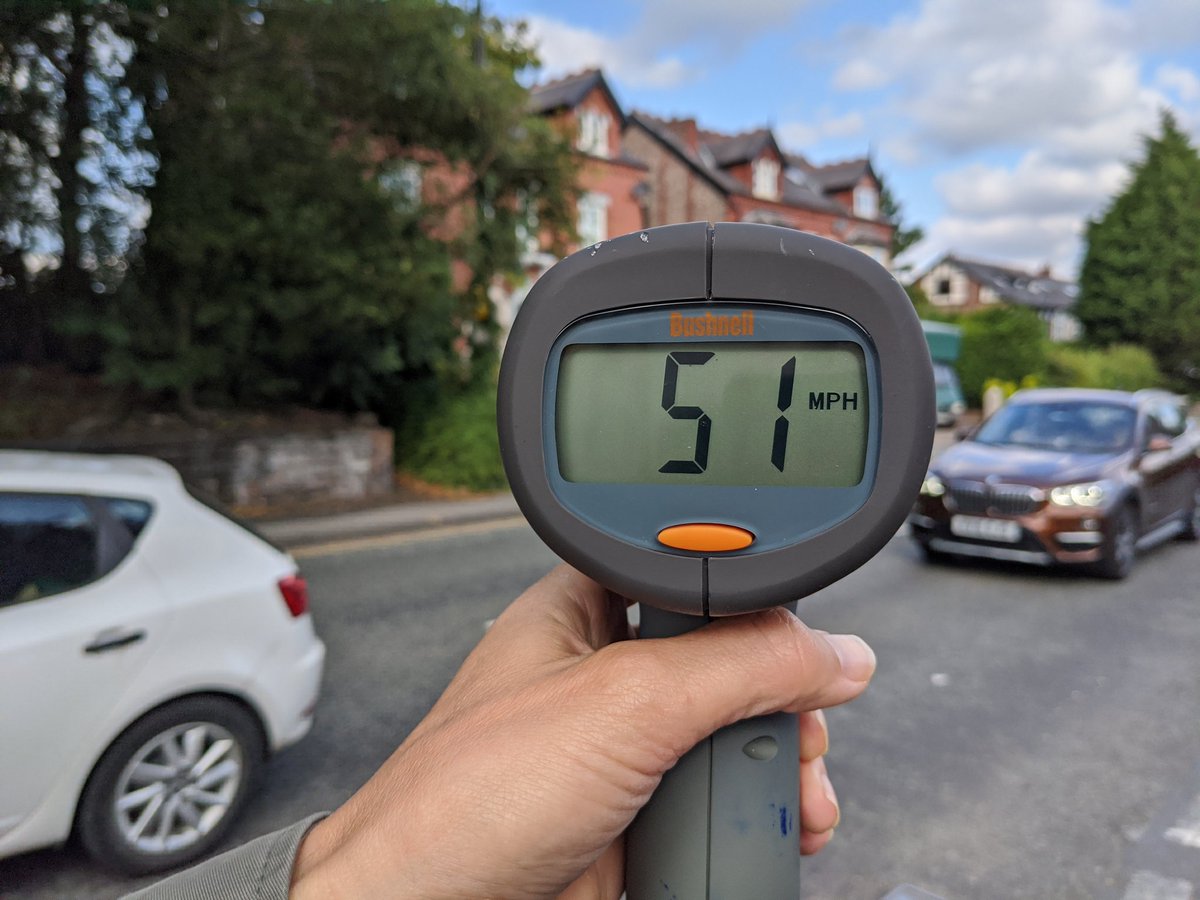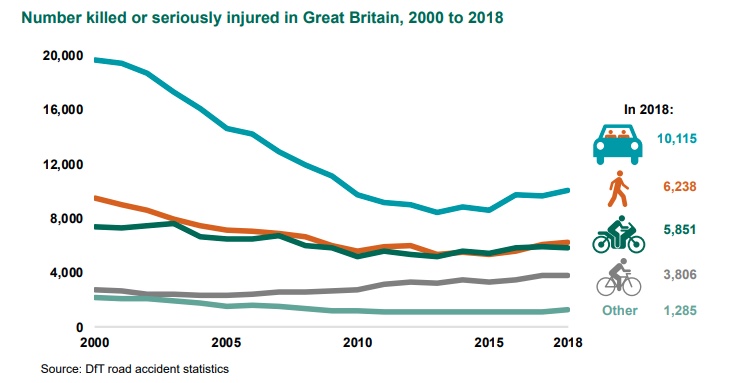We& #39;ve been out on the streets of #Altrincham and #Hale with the @traffordgreens speed gun, and recorded some pretty shocking figures. On Wednesday we& #39;ll present a motion asking @TraffordCouncil to reduce the default speed limit on our urban streets to 20 mph. Here& #39;s why:
20 mph limits are hugely popular according to national surveys. We know this is true locally because residents are constantly asking us for action to slow traffic down on their streets. This should come as no surprise, given the changes on our roads over the last 20 years.
In 1991 I was 15. There were 20 million vehicles on the road in the UK. When my son becomes a teenager in 2022 there will be 40 million vehicles on the road. Twice as many cars and lorries sharing the roads I want him to be able to cycle to school on, just as I did.
Not only are there more vehicles, but their drivers are using residential roads way more. Mass availability of SatNav tech and apps like Waze has doubled rat running, sending cars down formerly quiet streets just to save a few seconds of journey time. https://www.theguardian.com/world/2020/sep/25/rat-running-residential-uk-streets-satnav-apps">https://www.theguardian.com/world/202...
And those 40m vehicles driving more on our residential streets are getting bigger, heavier, faster and quieter. SUVs, Electric Vehicles and the constant flow of to-the-door delivery lorries all bring a lethal cocktail of new dangers to our streets.
It& #39;s no surprise that the long term decline in road deaths plateaued in 2010, and has now gone into reverse.
For all these reasons, most people support 20 mph limits in principle. But there have been arguments for years about their effectiveness. Aren& #39;t they ignored by drivers? Will the police enforce them? Are they only effective alongside expensive changes to the road layout?
Evidence shows 20 mph limits do slow the average speed of traffic down, and best of all they slow the speed of the fastest, most dangerous drivers the most. It& #39;s not a huge drop, but significant. Research shows a 6% reduction in collisions with every 1 mph fall in average speed.
So 20 mph limits work, but not enough to get the highways engineers @OneTrafford excited enough to do much about it here yet. But this is small beer compared with the future potential of 20 mph limits, due to forthcoming changes to the technology built into the cars we buy.
Did you know that 1 million drivers in the UK already have & #39;black box& #39; data recorders in their cars, monitoring their speed and driving behaviour? They are really popular with young drivers, who are rewarded with lower insurance rates (not to mention a lower chance of dying).
So new technology is already changing driver behaviour, and this is set to go nova from 2022 when all new models of vehicle will come fitted with a compulsory speed limiter and a black box data recorder. By 2024 all new vehicles sold will have to have them.
2019 was a bad year for car sales, but even at those levels, 1 in 3 cars will have speed limiters fitted by the end of the decade. If your car doesn& #39;t have it fitted, one of the cars in front of you probably will, slowing you down anyway.
So, for the first time speed limits will have a strong element of self-enforcement. It won& #39;t just be down to traffic cameras and the police, and those old arguments about enforcement and adherence to 20 mph limits will swiftly become outdated.
The question for our politicians and highways planners is this. Do we continue with 30 mph limits just because that is what we& #39;ve always had? Or do we future proof our streets by choosing to move towards 20 mph limits now?
Wales has already made up its mind. They are making 20 mph the default urban speed limit by 2023. If you want to go deeper than this thread does, read their 20 mph Task Force final report. https://gov.wales/sites/default/files/publications/2020-07/20mph-task-force-group-report.pdf">https://gov.wales/sites/def...
Councils across the country are also adopting 20 mph limits. Among the latest, Tory controlled Westminster, Labour controlled Birmingham, & just this week Manchester committed to 20 mph in its Draft City Centre Transport Strategy. Will Trafford join them? https://www.manchester.gov.uk/downloads/download/7277/draft_city_centre_transport_strategy_2020">https://www.manchester.gov.uk/downloads...
On an international level, the UK signed up to the Stockholm Declaration this year, which calls for 20 mph limits where vulnerable road users have to share space with motor vehicles. The declaration has since been adopted by the UN. https://www.government.se/492199/contentassets/2b0b907242fc407da58757bf2b70370e/stockholm-declaration-english.pdf">https://www.government.se/492199/co...
Want more supportive acronyms? 20 mph limits are being brought to you in association with the letters ROSPA, NICE, WHO and PHE.
Also this week, Trafford& #39;s own Director of Public Health, @EleanorRoaf led the publication of the Greater Manchester Active Travel Public Health Manifesto, which calls for & #39;Reductions to speed limits in residential areas to 20mph& #39;. https://www.gmhsc.org.uk/wp-content/uploads/2020/09/GM-Active-Travel-Public-Health-Manifesto.pdf">https://www.gmhsc.org.uk/wp-conten...
As Eleanor will, very passionately, tell you, getting more people walking and cycling is key to tackling to so many of our public health, clean air and climate issues. But two thirds of people feel it is too dangerous to cycle on our roads.
This isn& #39;t surprising when we have a minimum speed limit for vehicles that is more than double the average speed of a cyclist. In the absence of segregated bike lanes, reducing the speed differential between cars and bikes is the best way to give people the confidence to cycle.
20 mph limits have something for everyone. They don& #39;t stop cars driving anywhere or take away road space, or attract anywhere like the controversy caused by temp bike lanes or LTNs. But like these, they can be funded from the Emergency Active Travel Fund. https://www.gov.uk/government/publications/reallocating-road-space-in-response-to-covid-19-statutory-guidance-for-local-authorities">https://www.gov.uk/governmen...
So let& #39;s get on with future-proofing our streets, starting at Wednesday& #39;s @TraffordCouncil meeting. If you are still not convinced, imagine what is coming when driverless cars hit our residential streets. Will you want them zipping quietly round corners 30 mph? Thought not.

 Read on Twitter
Read on Twitter



